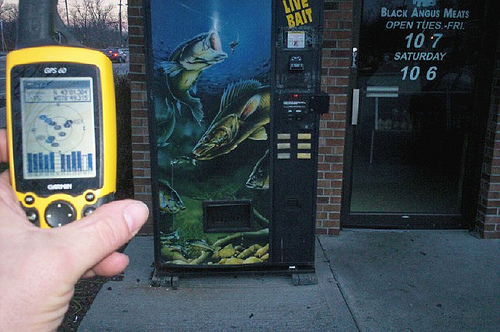Many Geocachers are familiar with coord.info redirects (or “link shorteners” or “shortcuts”), which can be used only for Geocaches, Travel Bugs and Waymarks listed on Geocaching.com and Waymarking.com respectively. But did you know there is another redirect tool out there that works for almost every other Geocaching website in the world, as well as Geocaching.com listed caches, Travel Bugs and Waymarking.com listings? And as an added bonus, it’s even two characters shorter! That service is provided by the website coord.ch, and it’s very easy to use. Some cachers might not even be familiar with Groundspeak’s coord.info service, let alone coord.ch, so we’ll start with the basics.
Category: Navicache.com
After 10+ years, an FTF on a lonely Virtual Cache
 Recently, FTF was claimed on a cache in France that sat for over 12 years before being found. However, the finder of that cache declined to be interviewed by this blog, as he is a Groundspeak volunteer reviewer elsewhere in Europe. We did not know they were a reviewer before contacting them, and can totally understand that. Since we are the blog for an alternative or indie Geocaching website, we can tell you that in our world (Navicache.com, to be exact), FTF was recently claimed on a virtual cache created on August 10th 2004. The cache is on the somewhat famous Island in the foreground. Do you know where that is?
Recently, FTF was claimed on a cache in France that sat for over 12 years before being found. However, the finder of that cache declined to be interviewed by this blog, as he is a Groundspeak volunteer reviewer elsewhere in Europe. We did not know they were a reviewer before contacting them, and can totally understand that. Since we are the blog for an alternative or indie Geocaching website, we can tell you that in our world (Navicache.com, to be exact), FTF was recently claimed on a virtual cache created on August 10th 2004. The cache is on the somewhat famous Island in the foreground. Do you know where that is?
Read More
Webcam Caches; how they work, and a history
 |
| OCNA Webcam Cache at Towson University, Md. |
The OCNA blogger is going on vacation next week (by the way, there will be a guest post!), and was planning to hit up a Webcam Cache listed on our site near Philadelphia, Pennsylvania: Collingswood Webcam Cache. So keeping with the recent tradition on this blog of featuring a Locationless and Moving Cache, along with talking about how these caches work and a history of them, we will do the same this week with Webcam Caches, and also describe the three different types of outdoor public web camera’s that are used for Webcam Caches. As well as plug the fact that we still accept them on our website, as do fellow alternative Gecoaching websites Navicache.com, Terracaching.com and GPSgames.org. You can submit a Webcam cache on any of our sites right now! We list 33 active, 31 in the Untied States, and 2 in Canada, on the OpenCaching.us website. We have published over 40 of them. Approximately 95% of Geocaching.com accounts registered after they stopped accepting these caches in November, 2005, and therefore were never able to have a chance to create one. They are disappearing fast on that website, and very few are left. We have the numbers there, both in the USA, and worldwide, but you’ll have to read on for that.
Locationless Caches and some fun facts
Three weeks ago, we had one of our sporadically featured OpenCaching Network caches, Der Laputische Gruß, a Locationless Cache listed on our sister site Opencaching.de, but with posted coordinates in Washington, D.C. We had planned to do a follow up post on the general topic of Locationless Caches, complete with the OCNA Blogger, Mr. Yuck, going out and finding that cache, and a short video of him rendering the very strange Laputian salute in public. Well, thanks to the coldest and snowiest Winter on record in 25 years or so in the Northeastern U.S., that didn’t happen! So here’s a replacement picture of him logging the Locationless Cache Timmy Time (Terracaching.com waypoint name LCSY), way back on January 21st, 2007. Although this cache type was banned forever by Geocaching.com in January 2006 (in favor of the not very popular Waymarking.com), we have information on where you can go to still “find” over 1,500 of them, or even create your own for others to enjoy. We also discovered some historical fun facts about this cache type in the course of our research, so read on!
 |
| She blinded me with Scien-tology! (LCAA) |
Although generally known as Locationless Caches on the alternative Geocaching websites that still accept them, they were actually known as Locationless (Reverse) Caches on Geocaching.com. The Wikipedia definition, which is pretty good, is as follows: “Locationless/Reverse caches are similar to a scavenger hunt. A description is given for something to find, such as a one-room schoolhouse, and the finder locates an example of this object. The finder records the location using their GPS receiver and often takes a picture at the location showing the named object and his or her GPS receiver. Typically others are not allowed to log that same location as a find.” The reverse designation does make sense, as you are giving the cache owner the coordinates of the object, “reversing” the normal process of them providing you with the coordinates of a location that you proceed to.
In the Der Laputische Gruß blog post, we mentioned that Locationless caches are alive and well on fellow alternative Geocaching website Terracaching.com, and have been since that site’s launch in the Fall of 2004. There are currently 1,278 Locationless Caches available there as of the date of this blog post. They are scored separately from traditional caches. Also of note is that Terracaching.com does not support file uploads, you must host your logging photo’s somewhere on the web yourself, and use simple BB code commands to post them in your log.
 |
| Live Bait vending machine (Terracaching.com LCPK) |
There are other alternative sites where you can find LC’s too though. The 2nd most popular choice would be Geocaching Australia, which lists 379 of them as of the date of this post. A small percentage of them are designed to be done in Australia, but most are not. Additionally, other alternative sites have a handful of LC’s. OCNA Admin Dudley Grunt has compiled a list of the 16 Locationless caches available on Navicache.com in a post to their forums. GPSgames.org, which has many “GPSgames” besides Geoaching, has 5 Locationless Caches on a quick glance through their small number of listings. And it has been shown that some members of the OpenCaching Network have a handful of LC’s such as Der Laputische Gruß on Opencaching.de. These are generally listed as an unknown cache type, with no container. We at OCNA however, not included! We do not accept Locationless Cache submissions! This decision was made early on by our founder RVRoadTrip (since retired from the site), and we simply have never veered from that policy. We reserve the right to some day change our mind and list Locationless Caches, never say never!
One thing that has been an issue with LC’s dating back to 2001, when Geocaching.com started listing them, is the ability to search for them. How do you know what the LC owner is looking for, without reading hundreds, or even 1,200 cache pages? Sometimes you can get a pretty good idea from the cache name, but usually not. The solution is that people have made lists of available LC’s on the Internet, with links to the LC, and a short (usually 2 sentence or so) overview of what the logging requirements are. The OCNA blogger joined Geocaching.com in August, 2003, and remembers several personal web pages documenting the available LC’s. Most or all of which probably no longer exist. Why would they, they haven’t been needed in over 8 years! For Terracaching.com there is such a list on sister website Terracaching.eu, although it looks to be almost a year out of date at press time. As previously mentioned, OCNA Admin Dudley Grunt has made a list of the available LC’s on Navicache.com. If one exists for the 379 LC’s on Geocaching Australia, we haven’t found it. If we are wrong on either account (a more updated Terracaching.com list, or one for Geocaching Australia), be sure to let us know!
Fun Facts about Locationless Caches: We did promise some fun facts about Locationless Caches, didn’t we? These all pertain to their relatively short-lived, in the grand scheme of things, existence on Geocaching.com:
- Only 382 LC’s were ever created on Geocaching.com. They are documented on this bookmark list.
- LC’s were accepted on Geocaching.com only during a 17 month window, from September, 2001 until February, 2003.
- 89% of LC’s were placed in 2002.
- The first two LC’s, GC1C90 9/12/2001 Please donate blood cache and GC1CB8 9/17/2001 Candlelight Vigil were both “do anywhere” caches directly inspired by the horrific events of 9/11/2001.
- A moratorium was enacted on all further LC placements on 2/19/2003. Said Groundspeak CEO Jeremy Irish: “I have suspended all new locationless caches until the >April/May timeframe, when a better way of dealing with them will be in place.” In other words, to concentrate on other issues with the website at that time.
- Two LC’s were published long after the moratorium was enacted. But GCGHPX 9/27/2003 Firefighting vehicles was actually originally published in February 2003, archived, and republished. GCGYH7 9/23/03 Top of the watershed appears to have totally just got by the reviewer.
- All LC’s were forcibly archived and locked from further log entries on 1/3/2006. Those of us who were around remember that we had several months notice that they were going away forever.
- As of the date of this blog post, 93.84% of all Geocaching.com accounts registered after 1/3/2006, and never had an opportunity to log a Locationless Cache, if they so choose.

The OKAPI Project: The OpenCaching API
We at OpenCaching North America like to promote the fact that there are several Smartphone Geocaching apps compatible with our website (as well as several of the other OpenCaching nodes, as they’re called). We owe this to OKAPI, the OpenCaching API, and of course to the independent European developers who have written these applications. You can always access the list of currently compatible phone apps from any page on our website, at the link www.opencaching.us/articles.php?page=apps. Not a very fancy webpage, but it gets the job done.
We aren’t going to get overly technical in this post, but an API, which stands for Application Programming Interface, could be described as a software to software interface, as opposed to an end-user interface. You could say that with API’s, applications talk to each other without any user knowledge or intervention. Basically, we give developers access to our database, through OKAPI. Keep in mind, in the case of Geocaching websites, this is not only used for smartphone apps, and a developer could easily write a third party Geocaching Statistics program, for Windows and/or MAC.We must admit, “stats programs” for any of the OpencCaching nodes are not in high demand. But as an example of a non-smartphone app use of our API, Scout from Gpsgames.org uses the API to display OpenCachingNA caches on his Google Maps powered cache maps, along with caches from Navicache.com, and caches and Shutterspots listed on his own website.
The OKAPI project was launched in 2008, by our friends at OpenCaching.pl. They maintain the OKAPI Project Homepage, and an OKAPI News Blog. Both of which are written with developers in mind. There is also an OKAPI Project page for each OKAPI compliant OpenCaching node. Ours is here on our site, and you can navigate to the Project page for the other nodes, which are:
- OpenCaching.pl (Poland)
- OpenCaching.nl (The Netherlands, Belgium and Luxembourg)
- OpenCaching.org.uk (The United Kingdom)
- OpenCaching.de (Germany)
We have mentioned in the past that OpenCaching.us uses an older version of the OpenCaching.pl code. As does OpenCaching.org.uk. OpenCaching.nl, due to the hard work of Admin harrieklomp, is up and running with the new OpenCaching.pl code, a feat which we aspire to accomplish in the future! And finally, OpenCaching.de, they came on board with OKAPI compatibility in April 2013. This took a year of hard work by .de team, as Opencaching.de does not use the same code base as the OpenCaching.pl based sites.
OpenCaching.de is by far the busiest of the OpenCaching nodes, and as far as we know, still the 2nd busiest Geocaching website in the world, after Geocaching.com. So we at OCNA (and the whole Network) are excited that many, many developers are going to be taking a serious look at developing applications for our Network. As it stands, at least one developer a week requests a “key” for OKAPI. We get email notification of this.
So let us close by reminding you we have smartphone apps! Five of them, to be exact, along with two others that you can send our .gpx files to. They are OpenCaching for Android ($4.99), GeoCaching Buddy for Android ($5.23), Columbus for Android (FREE), GeoCaching Buddy for Iphone ($7.99) and GeoBasic for WindowsPhone ($1.99, and has a free trial version). Additionally, you can send our .gpx files to the great c-geo for Android (will always be free, and full compatibility with OKAPI is planned) and Geosphere for Iphone ($7.99). The Blogger is one of five people in America who uses WindowsPhone, so he has used GeoBasic, and gives it a thumbs up. Have you tried using any of these apps with our website? Feel free to comment below!
Post Update: Just four days before this blog post, on October 13th, 2013, the developers of the Geocache management software GAPP (a program similar to GSAK) registered with OKAPI, and announced OKAPI support starting with their latest version, 1.9.3.0.

Memorial Day (and GW) weekend in the USA
Memorial Day weekend is coming up in The USA, where OpenCaching North America is based. Since we have many readers (and even users) from outside the USA, our “Memorial Day” is celebrated the last Monday in May of each year, and is for honoring the Men and Women who died while in the service of our armed forces. Please, if you’re an American take some time to remember and honor these Men and Women in some way of your own choosing during the long holiday weekend. You can read about the long history of our Memorial Day (once known as Decoration day) in this Wikipedia article.
There is no denying that Memorial Day weekend has, over the years, increasingly become known as the traditional start of the Summer vacation season here. And for the relatively new hobby of Geocaching, it has become one of two weekends designated for the holding of the American phenomenon known as GeoWoodstock, an annual Geocaching (Mega) event. It can also be held the nearest weekend to our July 4th Holiday, known as Independence day. The choice of which weekend is up to the organizers of the event. The Florida Geocaching Association, host of this years event, has chosen Memorial Day weekend, as have the majority of the hosting organizations over the years.
We won’t get into the history of GeoWoodstock too much here, because who knows, we could think about it a few weeks out next year, and actually have an interview with it’s founder! And yes, it was founded by one guy, who held the first one June 21st, 2003, at a Boy Scout Camp in Louisville, Kentucky.
 |
| Geocachers Unlimited logo |
All these years later, GeoWoodstock XI (that would be the 11th edition, if you’re not into Roman Numerals), is being held Saturday, May 25th, 2013 at the Circle B Bar Reserve in Lakeland, Florida. Now for some shameless self-promotion! Geocachers Unlimited is a loose organization of Geocachers who use alternative Geocaching websites in addition to Geocaching.com. They can be found on Google+ and Facebook. They will be hosting the event Geocachers Unlimited Meetup @ The Mega listed on our website, as well as on Gpsgames.org, Terracaching.com and Navicache.com. This is usually a short event (the Blogger himself attended one at GeoWoodstock IX), but there is nothing “flash mob” about it. Just a meetup, as the name suggests. You can expect to see some moving caches loggable on our website passed around, as well as meeting site admin Dudley Grunt. The time of this event is 12:00 Noon.
Are you one of the thousands of Geocachers from all over the world attending GeoWoodstock XI in Lakeland, Florida, USA this weekend? If so, feel free to comment to this blog post, and share your experiences!
Useful GW links:
- The Circle B Bar Reserve
- Official GeoWoodstock XI site
- GeoWoodstock XI on Facebook
- GeoWoodstock XI listing on Geocaching.com
OpenCaching.us related links:
- OCNA Meetup @ The Mega listing
- Water Watcher A virtual cache in the Reserve listed on OCNA
- Aquatic Fowl Hooch A virtual cache in the Reserve listed on OCNA
- Lake Hancock Lookout A virtual cache in the Reserve listed on OCNA
- No Bull No Water! A virtual cache in the Reserve listed on OCNA



